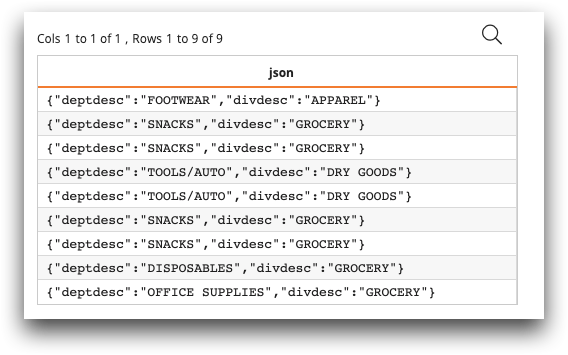r_mapjson(C;S;X;O)
Returns a string containing a JSON representation of a package for each row in a table. (Available as of version 15.21)
Function type
Vector only
Syntax
r_mapjson(C;S;X;O)Input
| Argument | Type | Description |
|---|---|---|
C |
any | A space- or comma-separated list of column names
If Note: The columns specified by
C must be either all numeric
(integer and decimal) or all text. |
S |
integer | A boolean column or an expression in
rcv_/rcn_/rct_ which determines
whether or not that column is selected to be included in the calculation. See System variables for more information about
rcv_/rcn_/rct_.If
|
X |
any | A column nameX is an expression that is used to transform the value or
name of each of the selected columns.Note: Use the system variables
rcv_, rcn_, and rct_ to
reference the column value, name, and type, respectively. |
O |
text | A list of options as accepted by the function
enjson(V;O).These options are as follows:
|
Return Value
For each row of the table, r_mapjson(C;S;X;O) returns a JSON
representation of the package value of a row. The keys of the package are the column names
specified in C. The values of the package corresponding to the keys are the
values at each column of X, an expression in
rcv_/rcn_/rct_. If X
is omitted, then the values are simply the values of each column (or rcv_,
the default). For example, r_mapjson(;;;) yields a JSON representation of a
package whose keys are the column names and whose values are the values of those columns at
each row.
Example
The following code finds the columns names beginning with the letter 'd' in the table pub.demo.retail.prod, selects only those columns that contain string data, converts the values contained within the columns to upper case, and returns the JSON representation of the resulting package:
<base table="pub.demo.retail.prod"/>
<willbe name="json" value="r_mapjson('d*';rct_='a';strupcase(rcv_);)"/>
<colord cols="json"/>
The C argument, 'd*', tells r_mapjson to
select only those column names starting with 'd'. The S argument,
rct_='a', tells r_mapjson to select only columns of type
string. The only columns beginning with 'd' and containing string data are
deptdesc and divdesc. The expression in
X,strupcase(rcv_), tells r_mapjson to
convert the values in each column to upper case. Finally, r_mapjson returns
a JSON representation of the package, using 'quotekeys' (the default).
